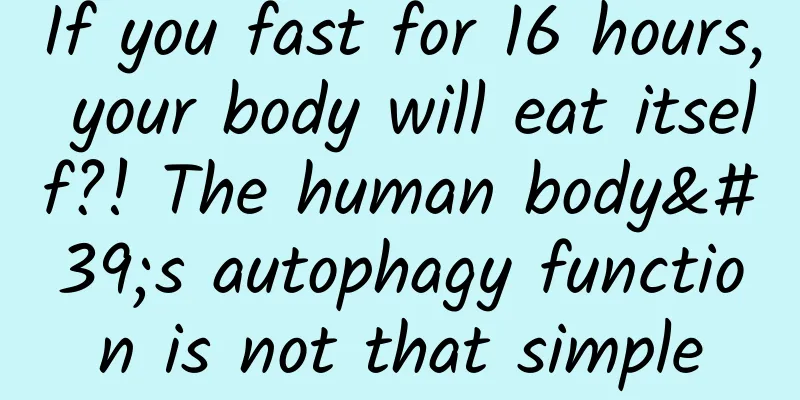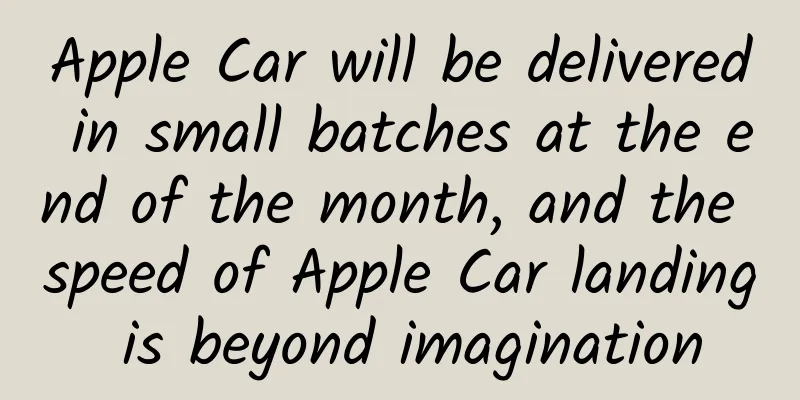If you fast for 16 hours, your body will eat itself?! The human body's autophagy function is not that simple

|
Author: Ye Shi Popular Science Creator Reviewer: Ruan Guangfeng, Deputy Director of Kexin Food and Health Information Exchange Center gossip Recently, a piece of news went viral on the Internet. The author said that if the human body does not eat for 16 hours, two functions will be activated: one is that the liver glycogen is consumed and the body begins to digest fat; the other function is called "autophagy", which means eating itself. Many readers may wonder about the statement that the human body will start autophagy after fasting for 16 hours : How can you really eat yourself after being hungry for less than a day? What exactly is this autophagy reaction? analyze Starving or restricting calorie intake for a long time can indeed promote the body's autophagy response. However, there is no clear answer to how long it takes to start the body's autophagy response. What exactly is the Nobel Prize-winning autophagy reaction? The word autophagy comes from Greek, where "auto-" means "self", and phagy is derived from "phagein", which means "to eat". So autophagy does mean "self-eating" , and it is appropriate to say that it is eating oneself. But this is a concept in cell biology that began in the 1960s, when researchers observed that cells can wrap up parts of themselves, send them to acidic lysosomes for degradation, and then recycle the degradation products, just like taking unwanted Lego toys and breaking them into small pieces to assemble other new shapes. Japanese scientist Yoshinori Ohsumi has made important contributions in the field of autophagy. He established his own laboratory in 1988 and then focused his research on protein degradation. He found that as long as yeast cells are starved, they will start autophagy and digest the parts they don't need to maintain the necessary physiological reactions and keep themselves alive. This is a bit like the story of "cutting thighs to serve the king" in ancient books. In order to prevent the later Duke Wen of Jin, Chong'er, from starving to death, Jie Zitui cut a piece of meat from his thigh and made soup for Chong'er to supplement his nutrition. Knowing that it is robbing Peter to pay Paul, it is also a last resort. Later, Ohsumi Yoshinori discovered a group of genes that are crucial to the autophagy reaction, and then revealed that autophagy is a complex process strictly regulated by cells and is the result of natural evolution. And not only yeast, but also human cells have almost the same autophagy reaction. Yoshinori Ohsumi. The picture comes from the Internet Thanks to Ohsumi and other scientists studying autophagy, we now know that autophagy controls cells to degrade and recycle their own components to provide energy for the cell or bring new raw materials for the cell's metabolism. More importantly, the autophagy reaction is closely related to our health - it can eliminate bacteria and viruses that invade cells, allow embryos to develop normally, and fight cell aging by removing damaged cell contents. If the autophagy function is disordered, it may cause diseases such as Parkinson's disease and diabetes. More than 50 years after the concept of autophagy was proposed, Ohsumi Yoshinori made us realize its important role in physiology and medicine. It is for this reason that in 2016, the Nobel Committee awarded the Nobel Prize in Physiology or Medicine to this scientist for "discovering the mechanism of autophagy." Can autophagy be initiated by starving for 16 hours? In Ohsumi's research, starving yeast can trigger autophagy. But in the human body, is it true that starving for 16 hours can trigger autophagy, as popular online information says? This question is complicated. According to the famous Cleveland Clinic, in animal studies, if you starve for 24 to 48 hours, you can basically start their autophagy reaction. In humans, it is certain that starvation or long-term calorie restriction can indeed promote autophagy. However, due to lack of data, there is no clear answer as to how long it takes to induce autophagy. It cannot be said that there is no research in humans. A review paper on autophagy in 2018 listed 35 studies on autophagy, of which only three were from humans. In these studies, the time required to initiate the autophagy reaction varied, with the shortest being 36 to 72 hours, and the longest requiring calorie restriction for 3 to 15 years. As for the 16 hours mentioned on the Internet, there is no clear source and basis. Copyrighted stock images, no reproduction is authorized In addition, in animal models, people have confirmed that autophagy can remove damaged cell parts, clean up erroneous proteins, or eliminate foreign pathogens, which is good for health. Therefore, the medical community is also developing drugs targeting autophagy, hoping to use it to treat diseases. Can you really lose weight by starving yourself for 16 hours? Interestingly, the 16 hours mentioned in the online news is related to another hot research topic. This involves a concept called " intermittent fasting " proposed in recent years, which refers to concentrating the time of eating in just a few hours a day and starving for the rest of the time. The most common "intermittent fasting" method happens to be 8-16, that is, eating is concentrated in 8 hours (for example, 9 am to 5 pm), and the remaining 16 hours do not eat. This method has achieved great success in animal experiments. It has been proven that in addition to helping experimental animals lose weight, it can also improve the animals' physical functions and even prolong their lifespan. A study published in the journal Cell in 2019 found that this "light fasting" can reduce the number of monocytes in mice and humans, which can produce a variety of cytokines that promote inflammation and can induce chronic inflammation. In animal disease models, mice that intermittently fasted for 4 weeks did show significant improvement in their condition. In January of this year, a study in Cell Metabolism, a subsidiary of Cell, found that intermittent fasting in mice helps reshape systemic gene expression, allowing most tissues throughout the body to have a more synchronized circadian rhythm, which also marks an improvement in metabolism. Other studies have revealed that it is not only necessary to be hungry, but also to choose the right time to be hungry. A 2021 study on fruit flies found that only those fruit flies that started to be hungry at night and starved until noon the next day would get obvious benefits from being hungry and their lifespan would be significantly extended. On the contrary, if you "eat a midnight snack" at night, even if you go hungry for the same length of time every day and eat the same amount of food, the fruit flies will still not get the benefits of being hungry. This time-related hunger is believed to be related to the autophagy reaction. This is because animals have biological clocks in their bodies, and the autophagy reaction is most active only at night. If food is consumed at night, the body will mistakenly think that it needs to remain active, and will inhibit the autophagy reaction. Over time, the garbage in the cells will not be cleaned up in time, which will be harmful to the cells. Copyrighted stock images, no reproduction is authorized But it should be noted that although this theory seems to make sense, it comes from animal experiments after all, and it is still unknown whether it can be applied to humans. Intermittent fasting is not very effective for weight loss. Reducing calorie intake is the key to effective weight loss. Currently, no authoritative health organization recommends fasting to people for weight loss. in conclusion There is some truth in the online news that hunger can trigger autophagy. But we should pay attention to a few points: First of all, it is not true that being hungry for 16 hours will definitely trigger the body's autophagy response. There are not many studies to prove this. The few human studies that have confirmed that the fasting time that can trigger the autophagy response often requires 2-3 days, which may not be suitable for ordinary people. Secondly, the autophagy reaction is a normal physiological function of the human body. Even if you are not hungry, you can activate it through exercise or reducing calorie intake. Third, "intermittent" hunger can indeed have a positive effect on the body, but the reasons are very complicated. Autophagy is only part of it, and currently no authoritative health organization will recommend fasting to people for weight loss. Finally, we also need to emphasize that if you want to be healthy, you also need to take a scientific approach. Trying to not eat or drink for a few days just to "start the autophagy reaction" may not be the right way, but may harm your body. References: https://www.nobelprize.org/prizes/medicine/2016/press-release/ https://my.clevelandclinic.org/health/articles/24058-autophagy https://www.sciencedirect.com/science/article/pii/S1568163718301478 https://pubmed.ncbi.nlm.nih.gov/31442403/ https://doi.org/10.1016/j.cmet.2022.12.006 https://doi.org/10.1038/s41586-021-03934-0 Planning丨Xu Lai Editor: Lin Lin Editor|Li Mengxin |
<<: Mushrooms grow little skirts! How many cute creatures have you seen in bamboo forests?
>>: There are so many fried chickens, why no fried duck?
Recommend
In product operation, why do we need to create hot products!
Why do we want to make a hit product? How do hot-...
Repairing a cell phone costs two thousand yuan, while buying a new one costs six thousand yuan. Why are official repairs so expensive?
Some time ago, I was walking on the street and se...
6 major information flow advertising platforms, which channel is the most powerful
iResearch predicts that in the next two years, in...
Can Apple TV really help video games? From Despicable Me: Minion Rush, we can see the difference between Apple TV and domestic Android hardware
Nowadays, there are more and more smart TVs in ho...
Why is Sichuan pepper so spicy?
Spicy and spicy. Spicy and spicy are always assoc...
Useful information | Product activity operation and promotion planning program!
Activities are a very important way to quickly at...
Yunnan will start school on March 23 at different times, and Hangzhou will complete the preparation plan for the start of school before March 25
As provinces gradually clarify the start time of ...
Behind Google's lower-than-expected performance: Search business is becoming increasingly saturated
On October 17, Google released its third quarter ...
A "tea-making party" that ignites your taste buds may quietly poison you
Your browser does not support the video tag What ...
Many people's hair turns gray too early! Gray hair caused by this factor may turn back to black
How old do you look? It has a direct relationship...
One million vehicles recalled, sales down 34.8%, Dongfeng Nissan may no longer be "far ahead"
Dongfeng Nissan used to be a far-leading player i...
Dismantling the virtual product project of Baidu's high-profit blue ocean, with a profit of 300+ per order
Friends who work in the Internet industry know th...
Conscience or black heart? Why doesn't Apple allow third parties to repair mobile phones?
Recently, a "right to repair" bill was ...
Fanstong | Practical sharing of strategy war game launch
"Invasion" is a 3D strategy war game de...
How can I explain to people that not getting enough sleep will also make you fat?
Losing weight is difficult, it is difficult, as d...









